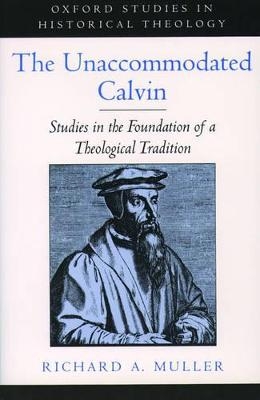
The Unaccommodated Calvin
Studies in the Foundation of a Theological Tradition
Seiten
2002
Oxford University Press Inc (Verlag)
978-0-19-515168-8 (ISBN)
Oxford University Press Inc (Verlag)
978-0-19-515168-8 (ISBN)
This title looks at Calvin in his 16th-century context, dealing with the differences of his thought and his predecessors, contemporaries, and successors. The author shows that Calvin's theology evidences the impact of humanist philology, patristics, rhetoric and that of medieval scholastic thought.
This book attempts to understand Calvin in his sixteenth-century context, with attention to continuities and discontinuities between his thought and that of his predecessors, contemporaries, and successors. Richard Muller is particularly interested in the interplay between theological and philosophical themes common to Calvin and the medieval doctors, and in developments in rhetoric and method associated with humanism. He shows that Calvin's theology evidences the impact of humanist philology and rhetoric, of patristics, and also - both positively and negatively - of the categories of medieval scholastic thought. Calvin's conclusions, together with those of a group of contemporary Reformed and Lutheran thinkers, famously became the basis of much later Protestant theology. But understood in its sixteenth-century context, Muller argues, Calvin's theology proves both intriguing and intractable to twentieth-century concerns. This intractable and unaccomodated Calvin, he says, is important to our historical understanding in direct proportion to the level of distortion found in several generations of modern dogmatic analysis of Calvin's thought.
This book attempts to understand Calvin in his sixteenth-century context, with attention to continuities and discontinuities between his thought and that of his predecessors, contemporaries, and successors. Richard Muller is particularly interested in the interplay between theological and philosophical themes common to Calvin and the medieval doctors, and in developments in rhetoric and method associated with humanism. He shows that Calvin's theology evidences the impact of humanist philology and rhetoric, of patristics, and also - both positively and negatively - of the categories of medieval scholastic thought. Calvin's conclusions, together with those of a group of contemporary Reformed and Lutheran thinkers, famously became the basis of much later Protestant theology. But understood in its sixteenth-century context, Muller argues, Calvin's theology proves both intriguing and intractable to twentieth-century concerns. This intractable and unaccomodated Calvin, he says, is important to our historical understanding in direct proportion to the level of distortion found in several generations of modern dogmatic analysis of Calvin's thought.
| Erscheint lt. Verlag | 7.3.2002 |
|---|---|
| Reihe/Serie | Oxford Studies in Historical Theology |
| Verlagsort | New York |
| Sprache | englisch |
| Maße | 226 x 165 mm |
| Gewicht | 445 g |
| Themenwelt | Geschichte ► Allgemeine Geschichte ► Neuzeit (bis 1918) |
| Geisteswissenschaften ► Philosophie ► Philosophie des Mittelalters | |
| Religion / Theologie ► Christentum ► Kirchengeschichte | |
| ISBN-10 | 0-19-515168-2 / 0195151682 |
| ISBN-13 | 978-0-19-515168-8 / 9780195151688 |
| Zustand | Neuware |
| Haben Sie eine Frage zum Produkt? |
Mehr entdecken
aus dem Bereich
aus dem Bereich
Europa 1848/49 und der Kampf für eine neue Welt
Buch | Hardcover (2023)
DVA (Verlag)
48,00 €
Giordano Bruno - ein ketzerisches Leben
Buch | Hardcover (2024)
C.H.Beck (Verlag)
29,90 €


